
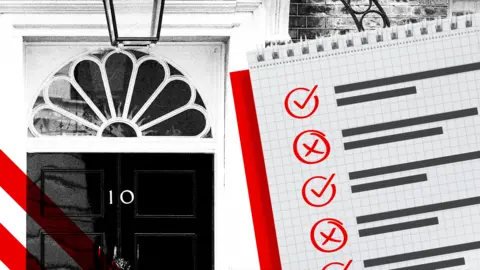 BBC
BBC
Sir Keir Starmer's Labour government stepped into power on 5 July 2024 with a thumping majority and tall ambitions.
That vision to "change" Britain - the word that has adorned many a red lectern - has on occasion come up against the harsh reality of politics in the year since.
So how is the government doing? Here, BBC News correspondents assess six key areas of Labour's policy plan.


A question of growth
Dharshini David
Deputy economics editor
Key pledges: The government says its number one mission is to put more money in pockets, which means growth. And for good reason: over the last 15 years, the UK has expanded at a fraction of its previous rate and some people failed to see living standards improve.
Status: It was a rocky start for the government as the economy flatlined in the second half of the year and ministers watered down their aim to have the fastest growth in the G7 major economies. Perhaps this was reality hitting over the challenges at hand. A pick up at the start of 2025 meant that GDP per person was about half of 1% higher by April than it had been last summer. So we're better off – but not by much.
Analysis: Rachel Reeves says the world has changed, while President Donald Trump's trade wars and greater geopolitical uncertainty make those growth ambitions tougher.
But the government's own policies risk weighing down the outlook for the next year or two. The rise in minimum wage has helped millions of workers but that and other policies - such as the increase in employers' National Insurance contributions - are weighing on businesses profits and jobs.
There are more than a quarter of a million fewer employees than a year ago; the biggest losses are in hospitality and retail, among the sectors most likely to have seen their wage bills increase. Analysis of job postings by the Institute of Employment Studies suggests the increased hesitancy among employers dates back to the Autumn Budget as they braced for these policies to be implemented.


Net migration levels and small boats
Key pledges: To "reduce net migration" and "smash the criminal boat gangs".
Status: Net migration, the difference between people arriving and leaving the UK, has fallen sharply since the election. But the reduction has been driven largely by visa restrictions introduced by the previous government. Even tougher controls, including the closure of a visa scheme to fill vacancies in social care, are contained in new laws yet to be implemented.
Analysis: The government wants to reduce the UK's reliance on overseas workers by linking policies on immigration with employment training. However, Home Office advisers caution that increasing the skilled workforce does not guarantee a reduction in migration. Ministers believe tighter rules on worker and student visas, together with increased enforcement on illegal working, will mean significant falls in foreign arrivals - but net migration remains substantially higher than a decade ago.
Alongside policies to cut overall numbers, the government promised to restore order to the asylum system, end the use of hotels and "smash" the criminal boat gangs. However, small boat Channel crossings have increased significantly in Labour's first year and statistics suggest more migrants are receiving asylum support than at the election. The backlog of people awaiting an initial decision has decreased but this has been offset by a sharp rise in appeals. Hotel use is also slightly up, according to the latest figures.
While irregular migration accounts for only a small proportion of total arrivals, this aspect of immigration has a huge impact on the government politically and economically. The Treasury's spending plans are partly reliant on the promise to save billions by ending the use of asylum hotels by 2029, and the rise of Reform UK in the polls is seen by some as a sign of public frustration at small boat crossings.
The government has established a Border Security Command coordinating efforts to reduce illegal migration. Meanwhile, new legislation will treat people smuggling as a crime equivalent to terrorism. Deals with international partners and reports of an imminent returns agreement with France are seen as key to fulfilling the promise to "smash the gangs" too. Much depends, however, on factors beyond the UK's control.


Trump, Ukraine and the EU
Key pledges: Labour promised to "reconnect with allies and forge new partnerships to deliver security and prosperity at home and abroad". That included staying close to the US and resetting the UK's relationship with the European Union. It also promised "steadfast support for Ukraine".
Status: Allies say Keir Starmer has managed his relationship with Donald Trump well, securing a tariff deal - and US backing for a politically controversial plan to cede sovereignty of a joint military base in the Chagos Islands. He has also protected the AUKUS security pact with Australia and the US.
The UK has sustained support for Ukraine, working with European allies to keep pressure on Russia and help heal the rift between presidents Trump and Volodymyr Zelensky after their Oval Office bust-up. Starmer also led European discussions about plans for a post-war "reassurance force" in Ukraine. The UK has agreed a trade deal with India. It has also reset diplomatic relations with the EU, easing some trade regulations and agreeing a UK-EU defence pact.
Analysis: Starmer has discovered that governments can become consumed by foreign affairs and his first year is no exception. The chief criticism levelled at the government is that it is too cautious. Has it put enough pressure on Russia - targeting the $300bn (£220bn) of assets frozen in European jurisdictions, or sanctioning Russian wealth in London?
On the Middle East, the government has cut some arms sales to Israel. But it is under growing pressure from MPs to oppose more firmly Israel's deadly operations in Gaza and give formal recognition to a Palestinian state.
Critics say changes to UK-EU relations are too modest to boost the economy significantly and should go further. The China audit has been completed but the government is refusing to publish the document, citing security concerns. Critics say ministers are fearful of losing Chinese investment by being too explicit about security concerns.
On climate change, some MPs struggle to see the leadership that was promised. In opposition, Labour promised to "rebuild Britain's reputation on international development". Instead, it has slashed foreign aid to pay for defence spending, something some say has damaged relations with developing countries.


Teacher targets and VAT on fees
Key pledges: A drive to recruit 6,500 new teachers in England, and to start charging VAT on private school fees to pay for it, among other things.
Status: The government hasn't met its teacher target, according to the latest official headcount - though that dates from November. VAT has been introduced on private school fees across the UK - and there are concerns about private school pupils leaving the sector as a result.
Analysis: Training teachers takes time. The number of new trainees rose by 6% this academic year, but remained below target.
The latest figures from November show the number of secondary school teachers rose 1,400 in a year, while teachers in special schools and pupil referral units were up by 900. However, primary school and nursery teachers fell by 2,900.
In May, Education Secretary Bridget Phillipson specified that the aim was to recruit 6,500 expert teachers "across secondary and special schools". That prompted fury from Conservative shadow education minister Neil O'Brien, who accused the government of "moving the goalposts" by excluding primary school numbers.
Labour said it planned to fund the recruitment drive by adding 20% VAT to private school fees. The Independent Schools Council said private school fees were 22.6% higher on average in January compared with a year ago - £7,382 per term for a day school, up from £6,021.
Figures out last month suggested the number of private school pupils fell by 11,000 in a year. The government said that was "within historical patterns", but private schools say more pupils are leaving than normal. There have been concerns that smaller private schools are being pushed towards closure and about the impact on students with scholarships, for example.
Given the controversy, there will be close scrutiny of whether the money raised will have the desired impact.
For many parents in the state sector, the need for more school staff is pressing. Government proposals to reform the Special Educational Needs and Disabilities (Send) system - which has 1.7 million pupils, up 5.6% since last year - are due this autumn and parents will want to know whether staffing will match demand.


Reforms and U-turns
Alison Holt
Social affairs editor
Key pledges: Welfare reform to support more people into work and to champion the rights of disabled people, plus a National Care Service that delivers consistent, high-quality support across the country.
Status: There have been significant U-turns on welfare reform and efforts to restrict the number of pensioners receiving the Winter Fuel Payment. An independent commission into reforming adult social care started work in April 2025.
Analysis: When Labour came to power, many of those who work with the most vulnerable in society were hopeful. In conversations, they would tell me that even with the nation's finances tight, surely neglected services and support for older and disabled people would be prioritised?
The government would argue that is exactly what it is doing, but 12 months on, the more printable judgments of the same people would be "disappointment" and "confusion." That disillusionment is rooted in three policies – all in part shaped by saving money.
First, the surprise decision to limit the £300-a-year Winter Fuel Allowance to only pensioners in the greatest need, meant the universal payment was taken away from ten million older people. After pressure from Labour MP's, the government reinstated the allowance for three quarters of pensioners, but the U-turn raised questions about its authority and priorities.
Second came the welfare bill. The aim was to save nearly £5bn a year by 2030 on spiralling benefits costs. It tightened the criteria for Personal Independence Payments (PIP) and Universal Credit - the latter is paid to both working and non-working people on low incomes. Again, pressure from MPs led to another government U-turn and plans were watered down. It has potentially wiped-out long-term Treasury savings, according to some economists, and the whole saga has left many disabled people worried.
Finally, there is disappointment over what the government has not done. Reform of the overstretched, understaffed and financially squeezed adult social care system has effectively been pushed into the long grass. The Casey Commission, the latest review to look at how to fund social care in the long-term, will produce recommendations next year, but its final report is not due until 2028.
There is a financial and human cost to every policy and in the last year the government has discovered how difficult it is to find the right balance.


Waiting lists and structural change
Hugh Pym, Jim Reed
Health editor & health reporter
Key pledges: Cut hospital waiting lists, end 8am scramble for GP appointments, scrap NHS England.
Status: Some modest progress on waiting lists but more work to be done.
Analysis: Health Secretary Wes Streeting shocked many in the health world by saying on day one that the NHS was broken. His aim was to acknowledge what many patients felt - and now he is trying to demonstrate that he can fix it.
Near the top of that list is hospital waiting lists. The government says it has delivered a pledge for two million extra NHS appointments in England in its first year. But as of April, the waiting list for an operation or another planned appointment stood at 7.39 million - which has fallen since the election.
As things stand just under 60% of those patients are seen and treated within 18 weeks, well under the NHS's 92% target. That number has improved by less than a percentage point since Labour took office.
The government has promised to hit that target by March 2029, something doctors and patient groups have warned will be an uphill battle.
Elsewhere, a new contract has been agreed with GPs, with more money for surgeries, a promise to cut red tape and a 5.4% pay rise for resident - formerly known as junior - doctors. Staff are now again balloting for strike action, spelling possible trouble ahead.
Ministers have been eager to show a Labour administration is not afraid to reduce duplication and cut what they claim to be bureaucracy. In the process, NHS England, the administrative body responsible for managing the health service, has been scrapped along with hundreds of other agencies. But there is a risk that NHS managers will be distracted by the reorganisation above improving performance for patients, while reallocating savings to frontline services may not be simple.
And the publication this week of a long-awaited ten-year plan for the NHS may promise a new network of neighbourhood health centres, but how long will it take for them to make a difference?
Health is a devolved power so the Labour government only has responsibility for England, not other parts of the UK.

 9 hours ago
1
9 hours ago
1

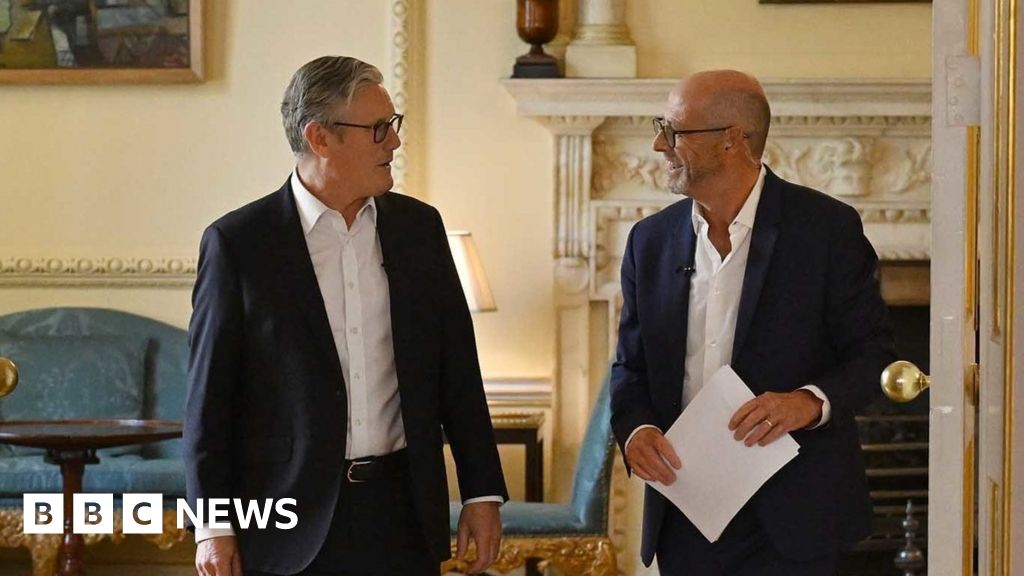
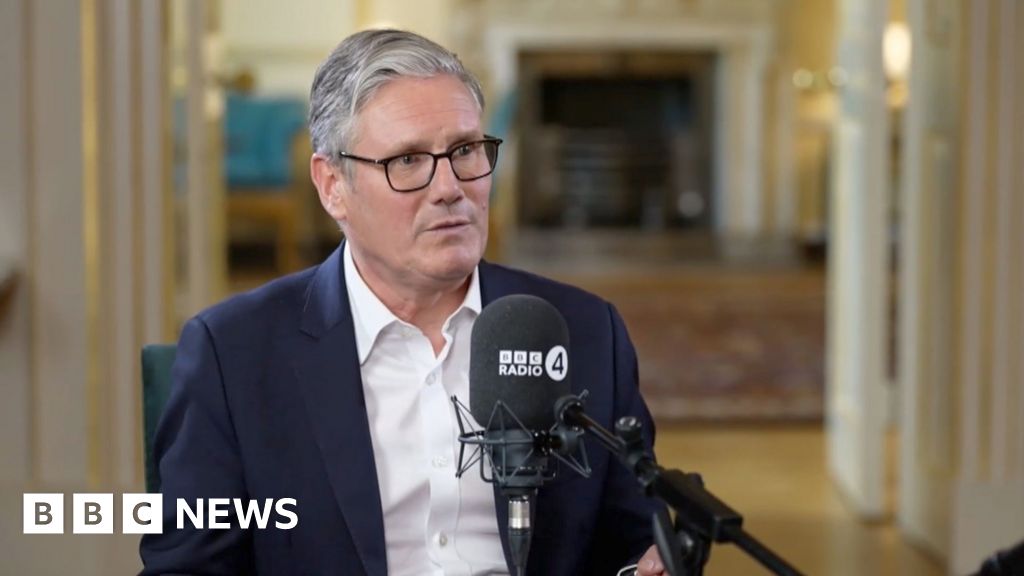
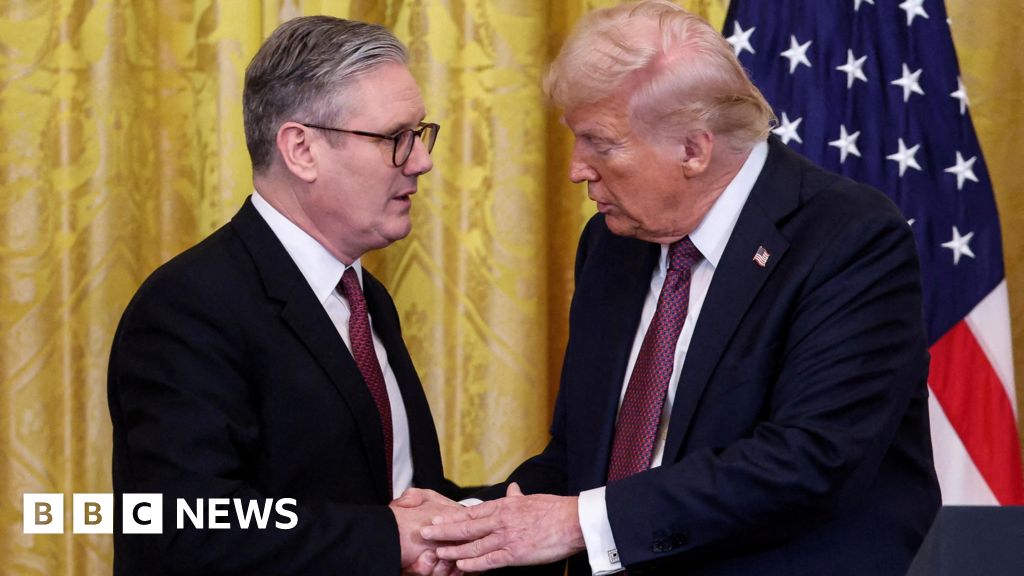

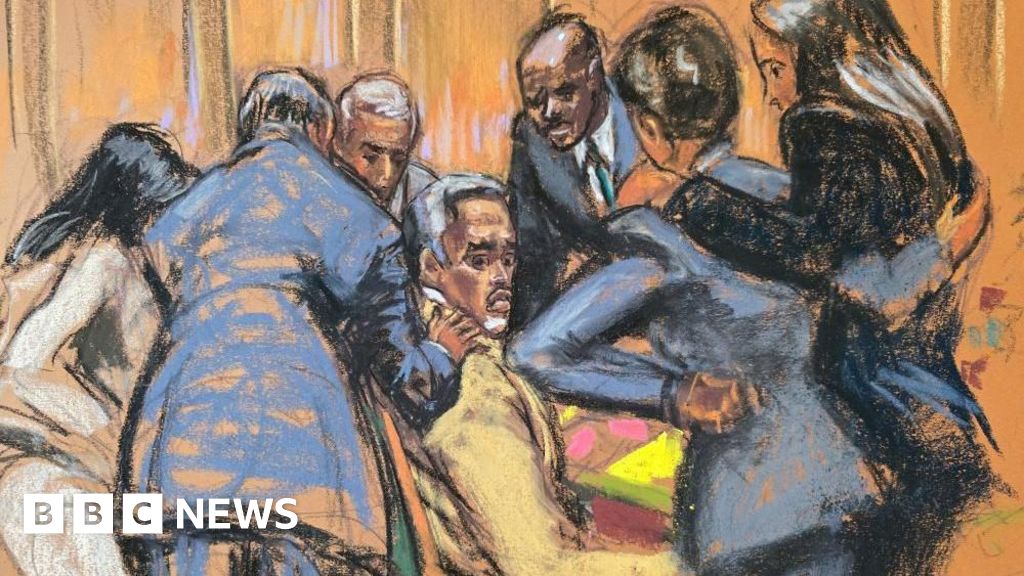




 English (US)
English (US)